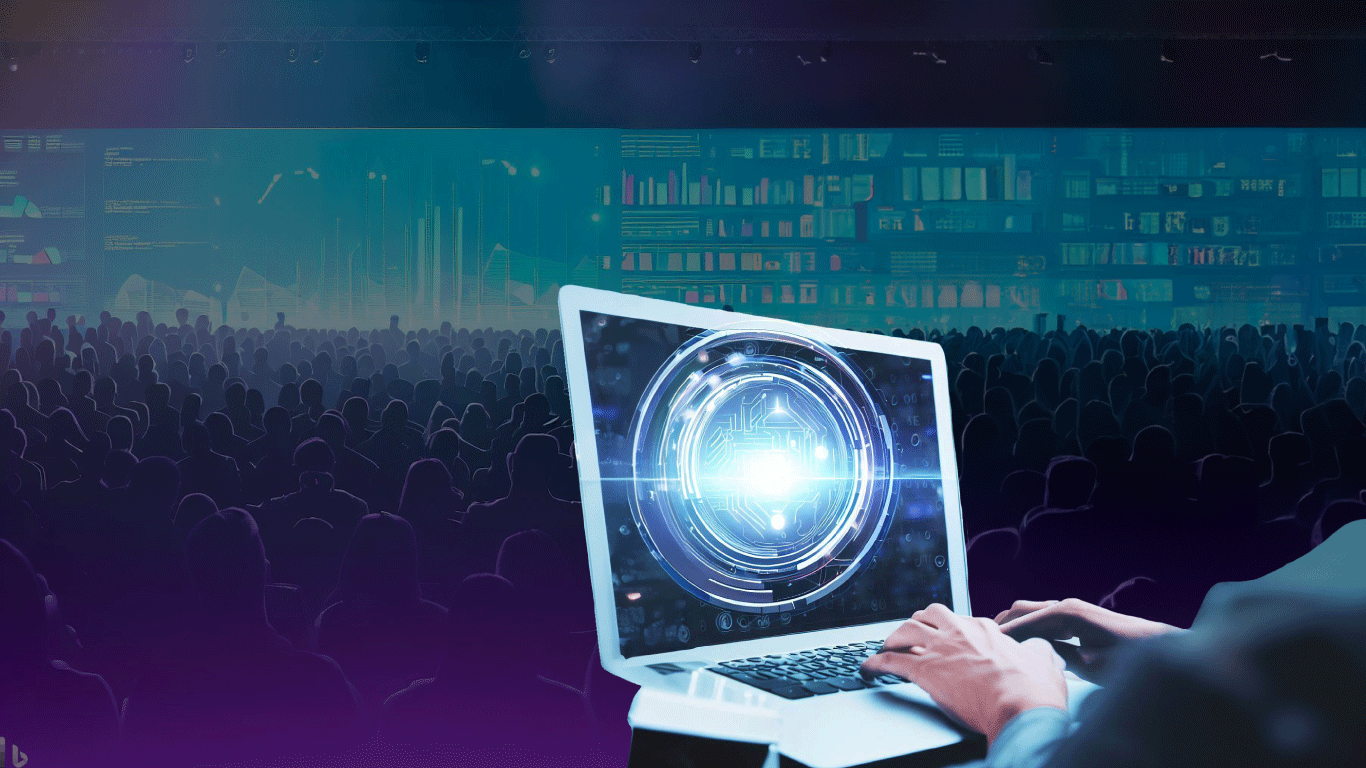Transforming Event Content with AI: A New Framework for Understanding the Impact
Transforming Event Content with AI


The proliferation of AI is making economic waves, too. By 2025, the global AI economy is expected to reach $190.61B, with 8.4B AI-powered digital assistants aiding our collective productivity (that’s more chatbots than humans).
Event leaders are uniquely positioned to experiment with AI in a myriad of applications. In this article, we’ll share a framework for understanding how AI can transform event content from inception to analysis. Before we dive into the framework, let’s align on AI as a concept and how it’s taking shape in our world.
Concept Alignment
Understanding the AI Spectrum.
At present, our understanding of AI includes two major categories: (1) Generative AI, which refers to AI systems capable of producing new content or generating outputs based on patterns and data, and (2) Artificial General Intelligence (AGI), which possesses human-like cognitive abilities across a wide range of tasks and domains. However, it's important to note that AI is not limited to these two modes but rather spans a spectrum with varying degrees of capabilities and sophistication.
Generative AI is the type of AI we are most familiar with today with technology like Open AI and GPT. “GPT” is an acronym for Generative Pre-trained Transformer which is a type of large language model (LLM). GPT acts as a neural network that can perform various natural language processing tasks.
“Pre-trained” means that each version of AI is trained on a set of content (i.e., the internet), and “generative” means that it is capable of creating its own answers. “Transformer” refers to its ability to take the pre-trained material and produce an outcome based on the probability that the response will be accurate.
There are five types of Generative AI
- Text: AI that generates human-like text or written content based on patterns and data
- Visual Media: AI capable of creating or manipulating images, videos, or other visual content
- Speech and Audio: AI that generates realistic or synthesized speech, music, or other audio output
- Code: AI systems that generate or assist in the creation of programming code or software
- Generative Interfaces: AI that creates interactive and dynamic user interfaces, allowing users to interact with AI-generated content or systems. For example, you can ask, “What should I have for dinner?” It will ask you a few questions about your preferences and order your dinner for you.
Artificial General Intelligence (AGI) refers to a form of advanced artificial intelligence that has the capacity to understand and learn from its environment, perform various tasks, and generate smart solutions. It goes beyond specialized applications and aims to mimic human behavior with cognitive abilities and reasoning. Experts expect AGI to arrive in the next three to five years.
With this understanding of the spectrum of AI, let’s shift our focus to Generative AI for event content with a new framework.
Transforming Event Content with AI: A Framework
There are four primary domains that outline the ways AI can support the development and dissemination of event-related content, as stated by Meghan Keaney Anderson, VP of Marketing at Jasper: ideation, acceleration, and adaptation. Additionally, Opus Agency has determined analysis is a crucial advantage of AI for event marketers.

Ideation: Enhancing the Creative Process
AI-powered tools can enrich brainstorming, teamwork, research, and idea generation for event content. Before drafting an agenda or calling for speakers, consider new suggestions from AI. Craft a prompt with relevant background information (number of attendees, location, objectives, etc.) and ask specific questions that will support your ideation phase.
Examples of prompts for AI-generated event content ideation:
I am planning a user conference for a leading technology brand. There will be 20,000 attendees, and the goal of the event is to share knowledge, demonstrate new products, and advance our pipeline. I want attendees to feel inspired when they leave and consider purchasing our product. Help me with the following:
- Tell me about the competition
- Create an agenda template
- Suggest speakers and entertainment
- Develop session topics
- Position sessions within the agenda
- Draft creative questions for panelists
Apps to explore for content ideation:
- Beautiful.ai — Slides and presentations
- ChatGPT — Ideas and inspiration
- Mem.ai — Note-taking and organization
- Productchamp.io — Market and product research
- Writesonic — Copywriting and paraphrasing
Acceleration: Streamlining Content Execution
AI greatly increases efficiencies, making it a fantastic tool to support condensed timelines and budgets. By automating repetitive tasks and streamlining processes, AI enables event planners to allocate their time and resources more effectively.
Examples of AI-supported event content acceleration:
- Automate email marketing
- Add new speakers and sessions to the agenda
- Create multiple landing pages and websites
- Draft and schedule bulk social media content
- Write speaker bios and session descriptions
- Efficiently organize event content
Apps to explore for content acceleration:
- Copy.ai and Unbounce — Marketing copy and content
- PhantomBuster and Woodpecker — Leads and sales automation
- Tailwind — Social media and marketing content
- Superhuman — Email triage and automation
- Unbounce — Landing pages and platforms
Adaptation: Tailoring Content to Audiences and Platforms
AI can take pieces of content and adapt them for different audiences by analyzing the content, identifying its key components, and then intelligently adapting them to appeal to a variety of audiences through advanced natural language processing and machine learning algorithms. With the help of this capability, event planners can repurpose event materials like keynotes, presentations, and workshops to reach and engage a variety of audiences with content that is personalized for their unique preferences.
Examples of AI-supported event content adaptation:
- Localize content into different languages
- Generate transcripts
- Draft blogs, newsletters, and social using recordings or transcripts to give content extended life
- Edit presentations for online/platform distribution
- Flag sensitive speech or confidential information
- Extract content to create highlight reels for YouTube Shorts, TikTok, and Instagram Reels
- Produce long-format videos and podcasts
- Develop marketing materials for the next event
- Rapid-fire tops/tails editing for remote records
Apps to explore for content adaptation:
- Lumen5 — Video creation
- Nolej — Interactive coursework and e-learning
- Simplified — Blog generator
- Vidable — Transcription and editing
Analysis: Leveraging Data for Insights and Optimization
Imagine running 200 sessions over the course of three days at an in-person event and instantly cataloging, flagging, notifying, and analyzing all content in real-time as people speak. Utilizing AI for data optimization is an invaluable asset for event professionals. Insights into sentiment analysis and social media monitoring can measure audience engagement. This type of analysis provides data-driven decision-making for event improvement and ROI optimization.
Examples of AI-supported event content analysis:
- Upload results of post-event surveys to identify themes and streamline research
- Capture trends based on real, in-room conversations
- Collect FAQs based on questions asked during sessions
- Identify themes across breakouts and sessions
- Build algorithms to “rate” presenters
- Safeguard legal and brand compliance
Apps to explore for content analysis:
- Innodata — Sentiment analysis
- Nova.ai — Analyzer and search optimizer
- Opus — Keywords and virality scores (not affiliated with Opus Agency or The Opus Group)
- Video Indexer — Insights and engagement
Ahead of the Curve: Tips for Event Leaders
As these priorities and expectations change, event leaders should also adapt. Our advice—embrace AI as a strategic tool, not a replacement for human expertise. With so many new tools and technologies in the market, don’t feel overwhelmed by “drinking from the AI water hose.” Bring a focused, practical perspective to utilizing and learning AI.
For your team’s development, invest in AI training and upskilling early. The ability to create great prompts is a skill that will be fundamental very soon, especially as we see the rising popularity of jobs like “prompt engineers” and “prompt writers.” Collaborate with AI vendors and experts for custom solutions for the greatest, most meaningful insights and the biggest ROI. While it’s not necessarily new technology, AI has exploded in popularity in the last few months. With recent upgrades to graphic processing units (GPUs) and the development of hundreds of AI applications, AI is changing how we interact with the internet, conduct business, and consume and create content.
More Like This, Delivered to You
As our agency continues to explore the future of experiences, you can join us and leaders from Google, Microsoft, Salesforce, and many more of our clients to stay ahead of what’s next by subscribing to XO. Each month, you’ll receive our latest insights and perspectives, plus carefully curated links worthy of your next new tab.
Insights in
the Inbox
XO is a newsletter with a mission to be loved by marketing executives and event professionals.
Through careful curation and purposeful prose, XO serves thousands of leaders who want to stay on top of what’s new and what’s next in the world of experiences.
To join in, see past issues or subscribe below.




